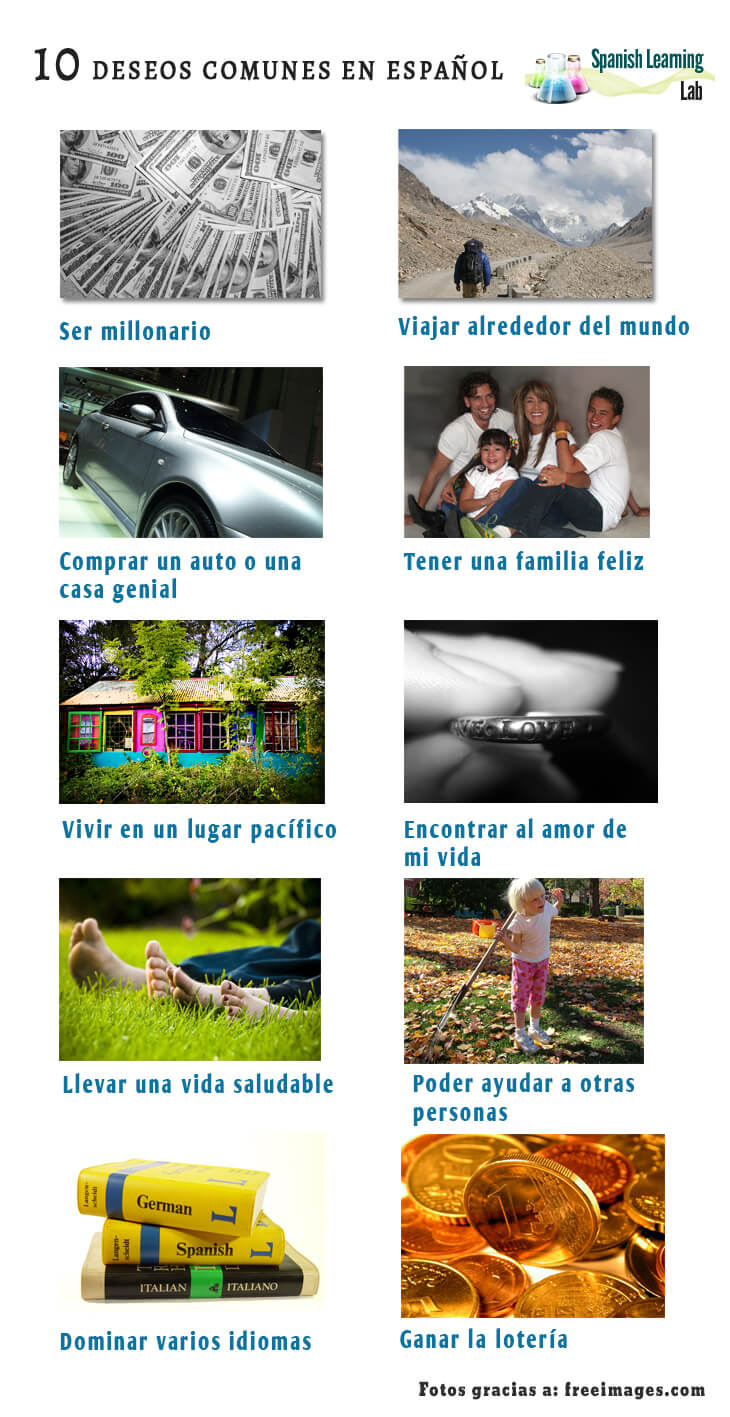Expressing wishes in any language is very important for formal or casual conversations. Just like in English, there is a specific structure to say what your wishes are. In this lesson, we will learn different ways to express wishes in Spanish by using the equivalent structure for “I would like to…”. You will see many examples with the verbs “Desear” (to wish), “Gustar” (to like) and others. Besides, you will have the opportunity to practice with two listening activities and their interactive quizzes. Comencemos…
Vocabulary and Grammar: Expressing wishes in Spanish.
Let’s begin by introducing 10 common wishes in Spanish people have, such as “Ser millonario” (being a millionaire) or “Vivir en un lugar pacífico” (living at a peaceful place). Know that you can check their pronunciation later with the audio examples in this lesson.

Saying “I wish” and “I want” in Spanish
In order to say what we “wish” and “want” in Spanish, we can use two verbs: “DESEAR” (to wish) and “QUERER” (to want). These verbs are commonly followed by a verb in infinitive such as “TENER” (to have) as in “(Yo) Deseo tener un auto”/”Yo quiero tener un auto“. Notice that QUERER is a stem-changing verb, so its stem will change to “QUIER-” for all pronouns, except for “Nosotros”. Listen to the following examples using both DESEAR and QUERER for expressing wishes in Spanish.
|
Yo deseo ser millonario
I wish to be a millionaire
|
|
Nosotros deseamos comprar una casa muy pronto.
We wish to buy a house very soon.
|
|
Yo quiero ganarme la lotería
I want to win the lottery
|
|
¿Tú quieres conocer a alguna celebridad?
Do you want to meet a celebrity?
|
“I would like to” for expressing wishes in Spanish
In order to talk about our wishes in Spanish, we must use the verbs GUSTAR (to like) and DESEAR (to wish), most of the time in their conditional form, which can be easily formed by adding the suffix “-ía” to the end of the end of these verbs. This way, “DESEAR” will change to “DESEARÍA” and “GUSTAR” to “GUSTARÍA”. You will also need a direct object pronoun before GUSTARÍA such as the words “ME” in “Me gustaría…” (I would like to) and or “TE” in “Te gustaría…” (you would like to). After the form GUSTARÍA, we will add an activity like the ones in the picture above, for example: “Me gustaría poder ayudar a otras personas“.
|
Me gustaría viajar alrededor del mundo
I would like to travel around the world
|
|
¿Te gustaría dominar varios idiomas?
Would you like to master several languages?
|
|
¿A ustedes les gustaría vivir unos noventa años?
Would you like to live 90 years?
|
The conditional form “DESEARÍA” can be used similarly to “GUSTARÍA” for expressing wishes in Spanish, with the difference that we will use regular subject pronouns not direct object pronouns. This means that instead of saying “Me desearía…”, we must say “Yo desearía…” like in “Yo desearía poder ayudar a otras personas“. In addition, DESEARÍA + infinitive will be used for the subjunctive in Spanish, that is sentences like “I wish I had” and “I wish I could”, which we will discuss in a future lesson. Bear in mind that the verb following DESEARÍA must be used in infinitive, e.g. “Desearía tener” (I wish I had…) and “Desearía poder” (I wish I could).
|
Desearía poder ayudar a otras personas
I would like to help other people
|
|
Desearía vivir en un lugar pacífico.
I wish I could live in a peaceful place
|
|
Ellos desearían explorar el espacio como en las películas.
They wish they could explore the space like in the movies
|
Last but not least, another way to say what you would like to do is by using the verb “QUERER”(to want) in its conditional form “Quisiera” as in “(Yo) quisiera ser millonario“. Here are more sentences about wishes in Spanish using the conditional form of these three verbs:
|
Quisiera tener un auto o una casa genial.
I would like to have a nice car or a nice house
|
|
La fundación quisiera ayudar a más niños en la comunidad.
The organization would like to help more children in the community.
|
Listening Activity No.1: Talking about wishes in Spanish
Listening Activity No.2: “If I won the lottery” – Si ganara la lotería
Key phrases in the conversation:
- “¿Escuchaste las noticias?” means “Did you hear the news?”
- “¡Imagínate!” Means “Imagine!”
- “Luna de miel” means “Honeymoon”
We got to the end of this lesson. We hope that you are able to get a general idea on how you can express what you wish for in Spanish with the verbs QUERER, DESEAR and GUSTAR. Keep on practicing with our resources! ¡Hasta la próxima!
Related Spanish Worksheets:
- The Conditional Simple in Spanish – PDF Worksheet
- The Conditional Perfect in Spanish – PDF Worksheet
- “What would you do if …?” in Spanish – Conversation Cards
